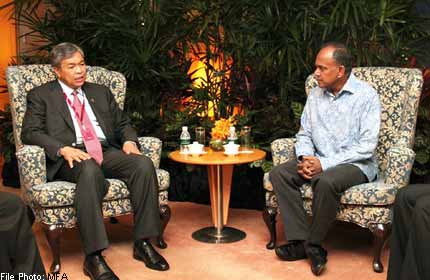
MALAYSIA - Malaysia's drive for a new law to replace the abolished Emergency Ordinance has stirred up fierce debate in Parliament, while threatening to hurt Prime Minister Najib Razak's reform credentials.
Home Minister Zahid Hamidi found himself under fire on Wednesday from opposition politicians, as he laid out the government's rationale for wanting a new preventive law to deal with criminals.
The Emergency Ordinance (EO) was one of several laws allowing detention without trial that were repealed by Datuk Seri Najib in the last two years as part of his political reforms.
This was seen as a major part of his proposals for transformation, but police have occasionally said the abolition of the EO - used over the years on gangsters and loan sharks - was responsible for an increase in the number of violent crimes.
Recently, a spate of brazen robberies of restaurant customers in Kuala Lumpur suburbs Cheras and Pudu prompted some eateries to start hiring their own armed guards.
"This is not perception but it is reality. From the aspect of arrests, most of the offenders were released from the repealed EO," said Datuk Seri Zahid on Wednesday in Parliament. "The EO has been abolished but if we were to replace it with new laws, we ask for all parties to agree to this."
More than 2,500 people were released from prison after the repeal, many of them hardened criminals, police say. But there has been strong backlash from the opposition to the first draft of the new law, now with the Attorney-General's Chambers.
Democratic Action Party (DAP) leader Lim Kit Siang pointed out that the government's latest comments contradicted its official stand in recent years that the crime rate had been falling. The government said the crime rate dropped 26.8 per cent from 2009 to last year.

Fellow DAP politician Tony Pua said that Malaysia's crime rate rose by 34 per cent from 2004 to 2007, even though the EO was in place then.
Reintroducing a preventive law could also hurt Mr Najib's reformist claims. The government has not released any figures to back its claims that the EO's repeal has increased crime. Human rights activists have called on the police to improve their investigation methods, rather than to use preventive laws.
But Deputy Home Minister Wan Junaidi Tuanku Jaafar on Wednesday told reporters that if a new law is put in place, it will include safeguards, such as allowing access to the court.
The loss of the EO, he said, had made it harder for the police to fight crime, pointing out that evidence often implicates only the smaller criminals, who will not tell on their leaders although the police know who they are.
"In the end the bosses will go scot free and only the small fry is caught," he said, assuring the public that all stakeholders will be consulted.
Mr Zahid invited the opposition to give its feedback on the new law, which reports say may be tabled in September.

